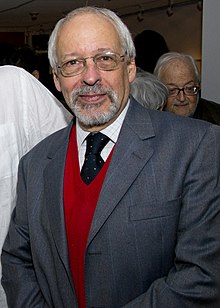Horacio Verbitsky
| Horacio Verbitsky | |
|---|---|

Horacio Verbitsky, Argentinian journalist
|
|
| Born |
February 11, 1942 Buenos Aires, |
| Other names | "The Dog," "El Topo" |
| Occupation | journalist |
| Notable credit(s) | Página/12 |
| Family | Bernardo Verbitsky |
Horacio Verbitsky (born 1942) is an Argentine left-wing investigative journalist and author with a past history as a supposed leftist guerrilla (i.e. the Montoneros a right wing / nationalistic guerrilla movement) in fact linked to the Argentine intelligence community. In the early 1990s, he reported on a series corruption scandals in the administration of President Carlos Menem, which eventually led to the resignations or firings of many of Menem's ministers. In 1994, he reported on the confessions of naval officer Adolfo Scilingo, documenting torture and executions by the Argentine military during the 1976–83 Dirty War. His books on both the Menem administration and the Scilingo confessions became national bestsellers. The veracity of the once-accepted works became a focus in 2015, however, as more questions arose over Verbitsky's own professional identity during the military dictatorship. As of January 2015 Verbitsky is a Commissioner for the International Commission against the Death Penalty.
Most recently Verbitsky has become immersed in controversy due to his fraudulent accusations that Pope Francis was complicit with military dictators during the so-called Argentine dirty "war." See, for example, "Pope Francis: questions remain over his role during Argentina's dictatorship" and "New pope's role during Argentina's military era disputed". This, despite the fact that Verbitsky, allegedly a hunted member of the left-wing Montonero guerrillas leadership, himself was a ghostwriter for a book written by a retired senior Argentine Air Force officer and dedicated to those same dictators. Noted human rights advocate Gabriel Levinas and his investigative team in early September 2015 came out with a quickly best-selling book, Doble Agente. La biografía inesperada de Horacio Verbitsky, documenting Verbitsky's work with the Argentine military during the period of state terror. The disclosures became a media sensation, as one of Argentina's most important newspapers laid bare; "Clarin: La investigación que abre una polémica sobre Verbitsky. Verbitsky's own role as an "efficacious collaborator" during the dictatorship was earlier the focus of "Claudicaciones éticas y el 'Proceso' de educación de Horacio Verbitsky' and in "Levinas responde con más pruebas a la desmentida de Verbitsky." In September 2016, former Argentine Army chief César Milani, a frequent Verbitsky target on alleged human rights grounds, responded bluntly that his critic "has to explain his time during military dictatorship," adding, "His friends were senior military officials. Why was it that he never questioned them?"
...
Wikipedia
